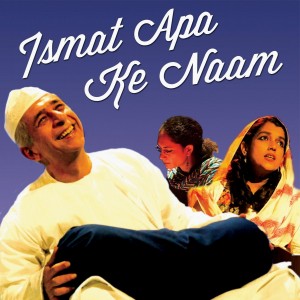There’s much more to the Indian art scene than Bollywood and Why Not Theatre intends to let Toronto theatre goers know
Composed of three short stories, written by the late feminist Indian writer Ismat Chughtai, Ismat Apa Ke Naam (by Why Not Theatre) is a blend of a reading and a one-man show. The show was performed at the Regent Parks Arts and Cultural Centre by renowned Indian actor Naseeruddin Shah, his wife Ratna Pathak Shah, and their daughter Heeba Shah. Each performer took us through a different story. The stage and the effects were simple. Lighting is used to convey changes in scene and mood – but generally stay the same within each tale.
Chhui Mui (The Delicate Darling) is the first story, narrated by Heeba Shah. The story takes place in a train compartment, and contrasts a pregnant upper class woman (Bhabijaan), whose marriage depends on her getting through her pregnancy and delivering a healthy male heir to her husband. This is in contrast to an unmarried woman who shamelessly gives birth in the same train compartment without breaking much of a sweat. Heeba Shah really hits her stride when she gets into the characters and physically engages with the story. Her voice is clear and concise and easy to follow.
Mughal Baccha (Progeny of the Mughals) is recited by Ratna Pathak Shah, and tells us the story of a stubborn husband– Kaley Miyaan, and Gori bi and their very difficult marriage. Kaley Miyaan abandons his wife early (really early) in the marriage, and the thing that prevents them from consummating it. Ratna Pathak Shah expertly conveys the two characters using her voice and intonation.
Gharwali (Mistress of the House) is about the relationship between Mirza, a bachelor and his maid (soon to be his prostitute), the stunningly beautiful Laajo. Naseeruddin Shah brought the most physical element to his performance, really giving you a sense of who Laajo and Mirza are. The story is witty, and yes a little bit bawdy, but definitely a fantastic finale.
All three of these stories examine women’s roles in three very different sets of circumstances – which was a theme extremely prevalent in Chugthai’s writing. As Naseeruddin Shah explains before the performance begins, Chughtai was best known for her short story Lihaaf (The Quilt), published in 1942. She was charged with obscenity, and the journal received a lot of angry responses to the story.
Even though today it’s hard for us in North America, to imagine an abandoned wife not moving on, or a woman so obsessed with delivery a healthy baby boy that her every move is made with extreme care, we are still far from equals in many societies around the world. These may not be the situations we find ourselves in, but it is definitely worth taking a look at how far we’ve come.
A note to non-Urdu/Hindi speakers – although there are surtitles, they are small and a bit hard to read. My show partner is not a Hindi or Urdu speaker, and couldn’t see the surtitles properly, and consequently was a bit lost.In addition, not everything is translated – the translation gives you a general sense of what is going on – but even for someone with intermediate but not fluent skills in the languages – there will be some nuances that are missed.
However, it is important that actors like Naseeruddin Shah show the world that there is more to the Indian arts scene than Bollywood. It doesn’t get much further from blockbuster Hindi films than this, but it’s worth the ride.
Details:
– Ismat Apa Ke Naam is playing at the Regent Park Arts and Cultural Centre (585 Dundas Street East) until October 7, 2012
– Shows run Friday to Sunday at 7:30pm
– Ticket prices range from $44 to $88 (Student tickets are available for $22, and a family pack of 4 tickets is available for $100)
– Tickets are available online, or by telephone at 1 (800) 838-3006

